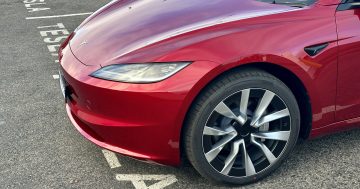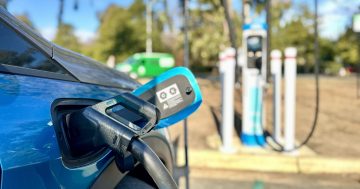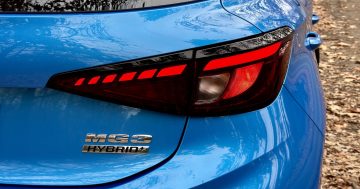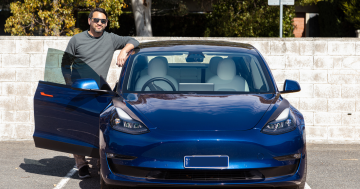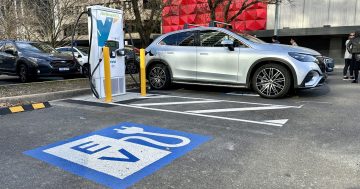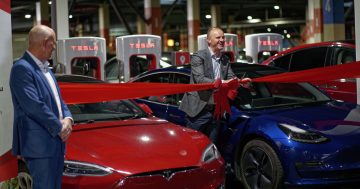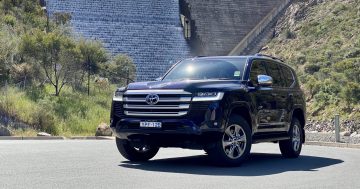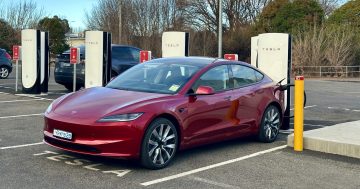
Canberra’s top-selling model, the all-electric Tesla Model Y. Photo: Tesla.
Canberrans are increasingly turning their backs on the internal combustion engine, with sales of new electric vehicles accelerating in 2023.
Unsurprisingly, Tesla remains their EV of choice, with sales approaching 2000 for the year – 1041 Model Ys and 761 Model 3s – compared with 725 in 2022.
According to the 2023 figures from the Federal Chamber of Automotive Industries, Tesla is now Canberra’s second favourite brand behind Toyota (2438) and ahead of Mazda (1568), but the Model Y and Model 3 took out the top two models, followed by the Ford Ranger (735).
Filling out the top 10 models are the Toyota RAV4 (588), Toyota Hilux (419), Mazda CX-5 (336), Mitsubishi Outlander (336), Subaru Forester (323), Hyundai i30 (302) and another EV, the BYD Atto 3 (290).
Sales of new EVs soared from 1280 in 2022 to 3396 out of the 18,531 new vehicles that Canberrans drove home.
When hybrid (1854) and plug-in hybrid (548) are factored in, the proportion of new vehicles Canberrans are buying with an eye on running costs and the environment amounts to more than 30 per cent.
Sales of solely petrol (8972) and diesel (3587) powered vehicles in the ACT actually declined in 2023.
Across the nation, EV sales amounted to 7.2 per cent of sales. When combined with battery electric, plug-in hybrid and hybrid vehicles, they accounted for 196,868 sales or 16.2 per cent of new vehicle sales.
Of the 87,217 battery-electric vehicles sold, more than half (46,116) were Teslas.
Only six new hydrogen vehicles were sold.
The figures show new car sales have recovered from the slump in recent years caused by COVID, microprocessor shortages and bottlenecks due to global shipping issues.
The ACT results are approaching the 2019 figure of 19,693, while nationally, a record 1,216,780 vehicles were delivered during the year, topping the previous record of 1,189,116 in 2017.
Toyota was easily the top-selling car brand, accounting for 17.7 per cent of the market, while the top-selling vehicle was the Ford Ranger (63,356).
The top 10 brands were Toyota, Mazda, Ford, Kia, Hyundai, Mitsubishi, MG, Tesla, Subaru and Isuzu Ute.
Australian drivers’ love affair with roomy SUVs continued, comprising 55.8 per cent of total sales. SUVs and light commercials combined for 78.4 per cent of sales and filled all the top 10 model slots.
Petrol and diesel vehicles are still king, but the trend is clear with just 5149 battery electric vehicles sold in 2021 but numbers skyrocketing in 2022 to 33,410 in 2022 and now more than 87,000 in 2023.
That trend should only strengthen once the Federal Government introduces a Fuel Efficiency Standard to cut emissions and provide an incentive for carmakers to inject more EV models into the Australian market.
The FCAI is optimistic that the government will introduce a Fuel Efficiency Standard that achieves the policy outcomes that lead to emission reductions while enabling Australians to drive the vehicles they need and want.
Chief Executive Tony Weber said the availability and affordability of products across all market segments would be the key to a successful Fuel Efficiency Standard.
“For more than a decade, the FCAI has been encouraging Governments to introduce a Fuel Efficiency Standard,” he said.
“Now we have the process underway, it’s critical that the Federal government takes the time to get it right. That is essential for environmental outcomes and for consumers.”
Looking ahead, Mr Weber expressed optimism about the industry’s future in 2024 while acknowledging potential challenges.
“The FCAI will continue its work with governments and other industry stakeholders during 2024 to manage a broad range of issues ranging from emissions standards, environmental impacts, logistics and supply chains, taxation, vehicle safety, data use and recharging infrastructure,” Mr Weber said.












